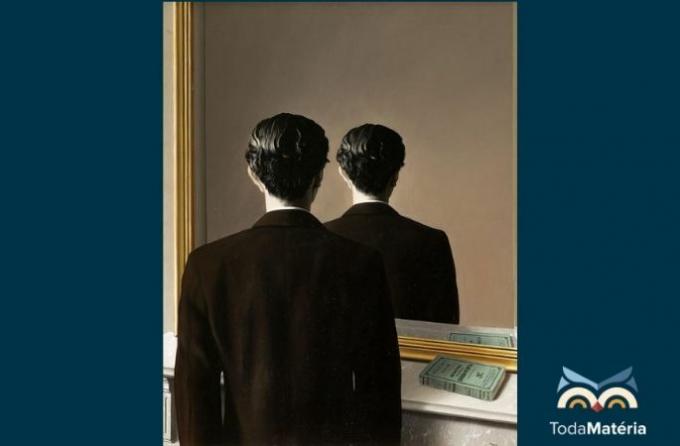To explain the relations of consciousness, it is first necessary to define it as Sartre did. Starting from the analysis of man's consciousness - a being that is in the world, that is, linked or inseparable while body-mind-worldO - it is possible to determine two beings: Being-in-itself and Being-for-itself. The first concerns things as they present themselves to us, whether they are a phenomenon (apparition) or not, that is, they exist in the world (Dasein), regardless of anything. The second, the for-itself, is the awareness that, when faced with the world, becomes a dynamic process (in contrast to the inertia of the in-itself) and makes the in-itself unveil.
This relationship highlights the nature of the For-itself: it is the nothingness that sees in objects its non-being, that is, related to the being-in-itself, it (the for-itself or consciousness) is not identified with any of the beings (in itself), being, therefore, a lack, a lack that is actually the motive to reach that rest of the in-itself. The for-itself wants to be.
The for-itself is also a contingent being, but unlike the in-itself, it wants to be the cause of its own existence and that questions its own being. In this is already implicit a concept of freedom that is characteristic of being-for-itself. That freedom allows a subjectivity to be objective and in this action is the responsibility that Sartre attributes to each man.
When consciousness is faced with a being (in-itself or for-itself), whether in the form of perception or imagination, it has a intention: The intentionality of consciousness in the face of (existing) phenomena is a denying form of other objects (external) and of itself (internal) and therefore it (consciousness) is the nothing that comes into the world through man and makes the relationship between being-in-itself and being-for-itself a reciprocal flow between them.
As consciousness cannot identify itself with any being-in-itself, it approaches this when in relation to another consciousness. This is because the action or choice as consciousness perceives the contingency and gratuitousness of its existence that generate the anguish after a feeling of nausea. Anguish because the responsibility lies entirely with the individual or each individual as a way of reacting to the world, things, etc., caused by the nausea of knowing that there is no God or a foundation that determines its essence. If, as Sartre says, existence precedes essence, man, as he is thrown into the world, is the one who develops his projects and is solely responsible for his actions. These actions can imply ethics. The relationship between consciousness is what allows choice to be truly universal. If the conscience is free and can choose, when this happens, it means that it means choosing freedom for all men, because man (conscience) is chosen.
Do not stop now... There's more after the advertising ;)
Thus, another is that it is the mirror for an individual (intersubjectivity) and determines the choice to act or not in the same way and can also better issue a judgment on that individual. Thus, from his phrase “hell is others” we have the conception that judgments are always partial. It is not the defense of a type of exacerbated egocentrism, but the ontological verification of possibility of choices is made universally due to the fact that when you choose, you choose the Liberty. There is a supposed notion that conscious choices become uniform, since conflict is inevitable between free beings who think and choose differently. But what can be considered more universal is that man is a being unto death.
By João Francisco P. Cabral
Brazil School Collaborator
Graduated in Philosophy from the Federal University of Uberlândia - UFU
Master's student in Philosophy at the State University of Campinas - UNICAMP
Would you like to reference this text in a school or academic work? Look:
CABRAL, João Francisco Pereira. "Consciousness and its relations with the other and the being-in-itself, according to Sartre"; Brazil School. Available in: https://brasilescola.uol.com.br/filosofia/consciencia-suas-relacoes-com-outro-ser-em-si-segundo-sartre.htm. Accessed on June 28, 2021.

